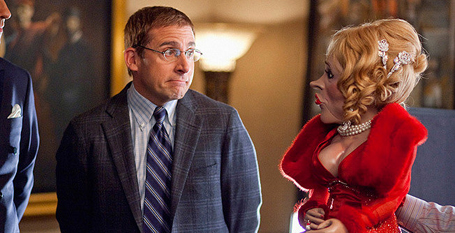
It’s a mean game and there’s no wonder that the American remake Dinner for Schmucks sugar-coats the entire premise in its famously puritan morality. The French original relishes in the mean-spirited premise of the dinner game. Its author, Francis Veber, realises that comedy is achieved by making ordinary people laugh at the misfortunes of others, that we are all a little mean-spirited inside. Le dîner de cons takes us through the entire cycle of comedy – laughing with the mean businessman at the bumbling idiocy of his dinner guest, then laughing at the businessman’s misfortunes as the guest makes demolishes his career, life, and finances in one short hour.
Apparently such a mode of comedy is too mean for the very nice Americans, where high school bullying and social embarrassment (see Judd Apatow’s output, for example) is as far as a mean comedy can go. Paul Rudd now takes the straight role as a middle management suit who has an unexpected path to career success when his boss invites him to play the dinner game. Steve Carrell takes the role of the well-meaning but bumbling dolt. In this outing, he plays the character not as a socially awkward bumbler but as an idiot savant who is so stupid he doesn’t know what a clitoris is, and has the demented facial expressions and antics of Mr Bean to boot.
The remake is aims for a slapstick farce, as opposed to the original film’s comedy of manners. Plot-wise, the sugar-coating of the script is problematic. Rudd’s character is clearly meant to be a big meanie who deserves all the bad things that happen to him. Yet he’s played as an all-round nice guy while all the characters aren’t rewritten to acknowledge that fact. Similarly, Carrell’s character played so over the top as a blithering moron, it’s hard to understand why Rudd would be a mean-spirited person for being nasty to him.
Dinner for Schmucks reprises the one hour length of Le dîner de cons, and tacks on another hour of fun and mayhem and an actual dinner to boot. How funny this comes across really depends on your taste in comedy. How the story plays out is indicative of the American predilection for moralistic, happy endings. One thing though – Jemaine Clement steals the entire show and laughs with his impression of a crackpot performance artist.












 Printable Version
Printable Version











Reader's Comments
Please log in to use this feature.